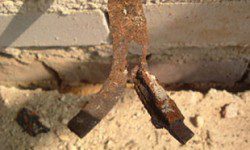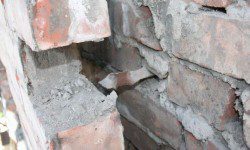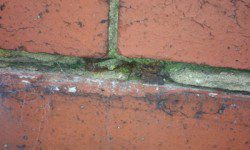Cavity wall tie corrosion
We have extensive experience in both inspecting the condition of the existing cavity wall ties and the undertaking of remedial works where necessary.
Typical signs of cavity wall tie corrosion:



Generally, cavity walls date back to just before the turn of the century, but, specific types of cavity wall construction date back to far earlier periods in history.
Cavity walls consist of two separate walls ‘tied’ together using some form of ‘cavity wall tie’. Old metal wall ties commonly came in the form of a strip of metal, with a black bitumen or zinc coating.
Over the years, it has become apparent that these ties were insufficiently treated and, given the right conditions, the ties start to corrode. Deterioration of cavity wall ties is a widespread problem to walls throughout the UK, particularly in exposed areas or in walls of particular construction and with specific mortar types.
The corrosion of cavity wall ties can lead to horizontal and stepped cracking to brickwork, bulging of brickwork and, in more severe cases, the external leaf of brickwork has been known to collapse.
The installation of new stainless steel wall ties is vital where corrosion or insufficient numbers of existing ties has been noted.
Cavity wall ties - frequently asked questions
What is a wall tie?
A wall tie is a steel bar or strap which is built into a cavity wall to hold the masonry together. Wall ties are crucial to the stability of external cavity walls. There are many types of wall tie and some are more prone to corrosion than others.
What causes a wall tie to corrode?
Any building can be subject to wall tie corrosion, but generally, the main issues are with properties built prior to the mid 1980’s (although it’s much more common in pre-war houses). Generally speaking, ties were not sufficiently galvanised. This, in conjunction with other factors, i.e; chemical action – for instance, where corrosive black ash mortar has been used, or location – such as marine environments with driving rain and salt laden atmospheres are common causes of cavity wall tie corrosion.
How do I know if my wall ties are corroded?
The condition of wall ties can only be shown by a visual inspection of the existing metal tie. This can be done by using an advanced optical boroscope. In cases of advanced corrosion, visual signs such as cracking and bulging of brickwork can occur, but, this is not always the case.
What can be done if the wall ties in my house are corroded?
In most cases, the installation of new cavity wall ties can be carried out to your property with very little disruption and is less expensive than people first think.
Don't my walls need rebuilding if I have wall tie corrosion in my property?
In the majority of cases, the answer is no. In more severe cases, where severe bulging has occurred, then re-building is sometimes necessary. An inspection by one of our fully qualified surveyors will be able to determine corrosion and inform you of any remedial work which may be required.
Will my new cavity wall ties not corrode?
No. The new remedial cavity wall ties, that are installed by RTC, are stainless steel and, therefore, cannot corrode; this, in conjunction with our genuine insurance back-up guarantees, will provide you with complete peace of mind.
What guarantees do RTC offer?
RTC are Property Care Association (PCA) members and, therefore, are able to offer the option of a long term insured guarantee for new cavity wall ties issued by the GPI.
Because the GPI guarantee is genuine insurance, it provides protection if the contractor ceases to trade for any reason. It is also transferable to the new owners if you sell your property. See www.gptprotection.co.uk for more information.
For any queries on cavity wall tie corrosion solutions, or to book a survey, please contact us.
Our staff will work closely with you from survey stage, right through to the successful completion of the contract.

